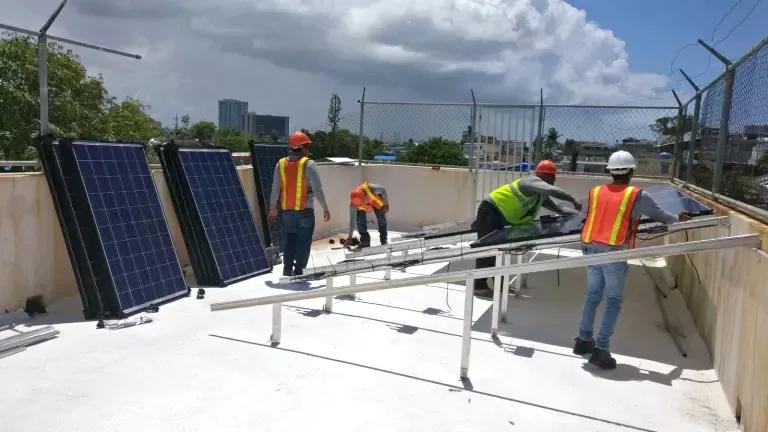La Borinqueña Joins Fight for Clean Energy in Puerto Rico
NRDC collaboration with La Borinqueña helps to spotlight Puerto Rico's ongoing struggle to transition to clean energy.

Artist Edgardo Miranda-Rodriguez with staff from NRDC, RPPR and LLF
NRDC
NRDC recently partnered with Edgardo Miranda-Rodriguez, the writer and creator of La Borinqueña, to spotlight Puerto Rico’s struggles to break its dependence on imported fossil fuels in a special edition of the comic book. Hurricane Maria devastated the island's electrical system when it hit in September 2017, leading to the second-longest blackout worldwide. After the storm, communities raced to transition to solar energy while the local electric utility struggled to maintain its monopoly by trying to switch from imported petroleum to imported LNG (liquefied natural gas, or very cold fracked gas) to generate electricity.
In the latest issue of the La Borinqueña comic book, the hero is battling shadowy evildoers in Puerto Rico who are sabotaging community attempts to install solar panels and batteries to deal with the consistent blackouts. In a case of life imitating art, Puerto Rico suffered yet another massive blackout on April 6—the same day of the book release—that left millions of residents without electricity for a few days. Unfortunately, in Puerto Rico, living with a failing electrical system has become the norm.
To combat the status quo, as I wrote in my recent blog, NRDC and our partner Resilient Power Puerto Rico, through the generosity of the Leon Lowenstein Foundation, continue our mission to empower communities to transition to clean energy. Over the last year, we have worked with networks of vulnerable populations to help address their climate resiliency, installing solar battery systems at three different sites. Through this work, we are supporting facilities critical to the people they serve (at the headquarters of Coordinadora Paz para las Mujeres, at the office of the Coalición de Coaliciones pro Personas sin Hogar, and at Mesón de Amor), as these organizations develop strategies and bring together the needed resources to reduce their vulnerability to natural and anthropogenic disasters and extreme climate events.
We believe that access to decentralized solar energy: provides communities with independence from the centralized grid, reducing the impact from future blackouts; offers reliable and stable access to energy, helping guarantee the continuous provision of essential services; and, most importantly, places control of crucial adaptation resources directly in the hands of local leaders and their communities.
Coordinadora Paz para Las Mujeres
Coordinadora Paz para las Mujeres is a nongovernmental organization that brings together a pioneering coalition committed to the eradication of domestic violence and sexual abuse in Puerto Rico, including emergency shelters, essential service providers, universities, feminist organizations, and human rights activists working to address gender-based violence.
According to Vilma González, executive director for Coordinadora Paz para las Mujeres, “[Hurricanes] Irma and María were our great teachers in terms of gender violence and the responses to disaster situations. These disasters have exposed the inequities and vulnerabilities that already exist and that are worsened in moments like those. We recognized access to electricity as one of our great challenges, particularly for shelters for victims of domestic violence. We had to identify resources to guarantee the safety of sheltering women and their children.”

Community Workshop to discuss solar microgrid installation
Coalición de Coaliciones pro Personas sin Hogar
Coalición de Coaliciones is an organization committed to improving unhoused and other vulnerable populations’ quality of life by applying evidence-based practices and advocating for their right to live in health, wellness, and full enjoyment of their dignity. Coalición brings together a network of service providers, including case managers, social workers, housing placement services, and medicine-based treatments for conditions related to substance use and behavioral health.
According to Francisco Rodríguez Fraticelli, executive president of the organization, “We confirmed that the shelters provided by the state create access barriers for homeless people because many of them have mental health issues or, because of their use of illegal substances, they are rejected, leaving them in the streets.” During emergency situations, the unhoused may not have access to most of the help provided by the government, so “we must provide it ourselves.”

Finished installation at Meson de Amor
Mesón de Amor
Mesón de Amor is a community project of the Casa de Amor, Fe, y Esperanza (CAFE; “House of Love, Faith, and Hope”), and its purpose is to provide free meals, housing, and services to the low-income student population in the area around the University of Puerto Rico, Río Piedras campus.
According to Angel Perez at Mesón de Amor, on the day of the latest blackout in Puerto Rico, “We were able to open and function like normal, thanks to the installed solar system. And that allowed us to continue providing the services we provide daily without interruption.”
While La Borinqueña is based on a fictional superhero, the three groups mentioned above are staffed by real-life heroes who are providing services to populations that are desperately in need of help. NRDC will continue advocating for policy changes to eliminate greenhouse gas emissions that cause climate change and to improve resiliency, now that we’ve entered a period of climate consequences. As our work in Puerto Rico is largely “project-based,” we’ve had the opportunity to create replicable examples while hopefully improving the lives for the communities in which we’ve been lucky to work. Now, through our partnership with La Borinqueña, we can introduce that struggle to new audiences who can learn about climate and resiliency, and hopefully also become advocates for the policies we need.




